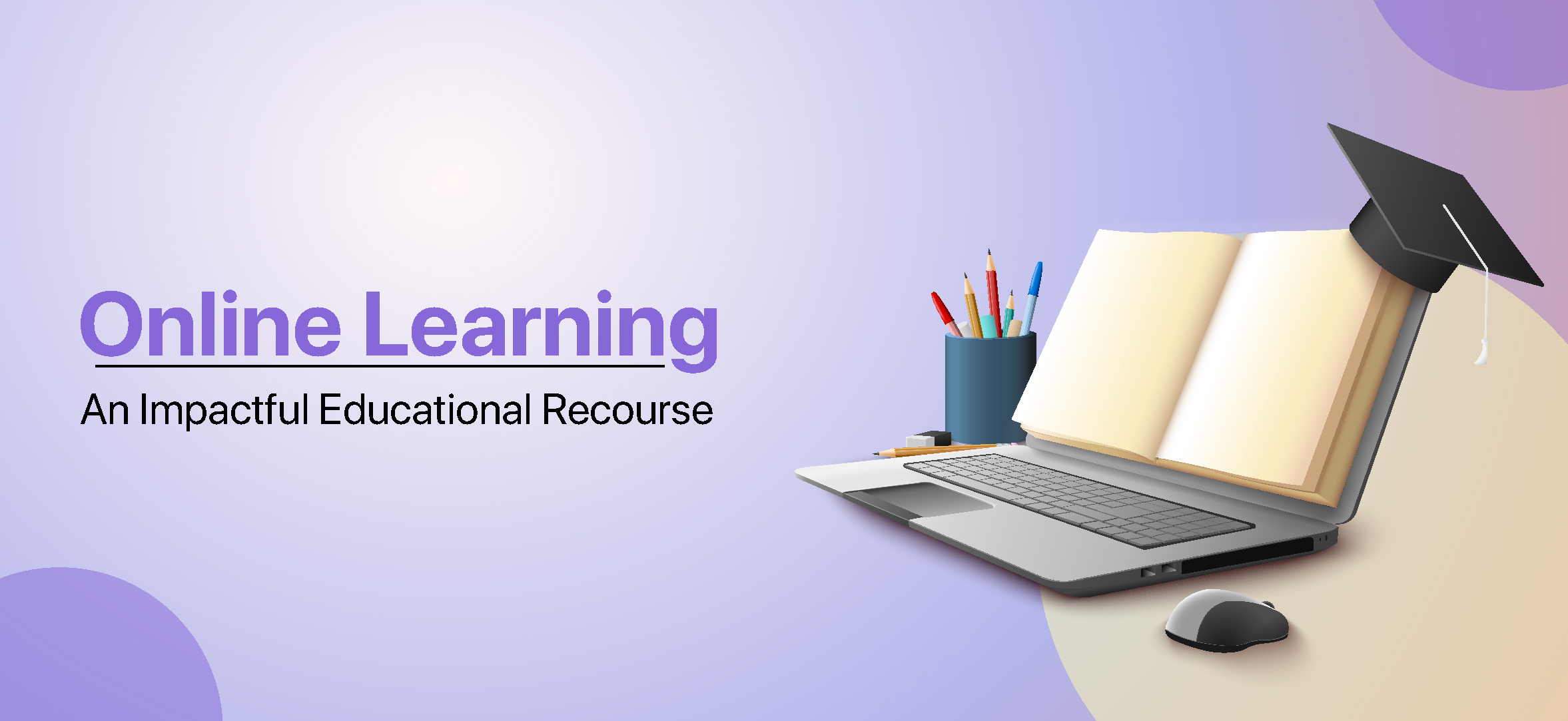Online Learning - An Impactful Educational Recourse
Blogs Home
- 21 Oct 2021

With the advent of the COVID pandemic that nearly shook the whole planet, all activities, businesses, trades and even social interaction came to a halt. The bigger question of saving lives of people came to the forefront and left everything behind. Such is the vulnerability of mankind.
However, the unstoppable will of human beings keeps everything at a productive pace. When businesses resorted to remote-working, the education sector also took refuge in online learning platforms. This shift to online learning may have saved future generations from a tremendous loss of education.
When schools, colleges and universities were shut down to prevent the spread of the virus, academic progress started to decline. This is when institutions started to take classes online in order to maintain a productive flow and to compensate for in-class learning.
Online classes and learning platforms were not a very new idea at this point of time but its mass appeal and usage was definitely something new. International educational programs, vocational courses, computer courses were still going on in the pre-pandemic world. However, online learning was now being used to safeguard the country's scholastic growth.
Thus, though not a new idea, this rare mass implementation became a saviour to this generation. Imagine what would have been the situation if online learning was never thought to be a solution?
Drastic, isn't it? There would not have been any new doctors, engineers, teachers, officers and many more professionals for a year or two. This break would have taken us years back with no generational development. Besides, students would have forgotten concepts, learning habits and even writing. Yes, that’s true.
Though the situation has stabilised still the virus is lingering around. After fighting it for nearly two years and losing so many lives, we still fear the coming of the third wave.
Here we would say that despite everything, online learning appeared as a successful solution to preserve the pedagogical world. Not only it came to save students and their progress but it also protected millions of teachers from unemployment and schools and institutes from shutting down forever.
The Sudden Transition
The traditional in-class learning experience shifted suddenly to a completely digital experience. However, it did involve face to face learning via audio and video tools. The internet had connected us once again and it did it well.
What many scholars believe is that while this sudden change did come as a saviour, it also brought a lot of challenges along with it. And it is actually true, because online learning requires more effort to maintain its effectiveness than the traditional learning model.
Interacting and disciplining students is rather much easier in a school environment than a home environment. However, the views and experience differ in many cases like in a comparative study conducted by Jasmine Paul and Felecia Jefferson, who are biology experts at Fort Valley University in the United States. According to their research, the online learning mode is practical, flexible and less restricted than the traditional mode; but to some it may not appear to be sufficient for learners. But in this study, the results of tests involving 548 students in total, in which 401 students were studying in the traditional mode and 147 via online, were compared. And surprisingly, or perhaps expectedly the result did not fluctuate. The results displayed no significant differences between the two modes of learning, proving that the online pedagogical shift is as effective as face to face learning.
Though the transition was abrupt, students and teachers have stealthily adapted to this new model and have understood its operational ways. The main question that invited attention was if higher education can stand this shift. Conducting practical training or advanced level studies via the online mode became a major concern.
Merging technology with education is a revolutionary step. Though the shift cannot fulfil certain aspects of traditional methods of learning (like practical studies), it cannot be said that it is without its huge list of pros.
Further, online learning with or without the pandemic is definitely flexible. With large numbers of articles and research papers on the internet, students can easily look beyond their prescribed curriculum and can think out of the box. This even opens up pathways to new ideas and theories that might contradict the existing ones someday! Instead of hurtling through a mass of books in libraries to find the best, students can just use a qwerty keyboard to look for suitable papers online in a jiffy.
The traditional ways need to be restored someday soon but it is undeniable that keeping a substitute always stands to help students at the time of need.
The best part about online learning is that it connects multiple students from different locations, different countries and brings them to one single platform all at once. Not only that, it also reduces the cost of education.
Importance of online learning in hard times
Online learning is not a new concept but yet it is not very common. Its importance got recognised only during the hard times faced due to COVID, as it became mandatory to adapt to this method to continue mass education. The following features of online learning are exactly what makes it an impactful educational recourse during turbulent times.
- Online learning provides students a greater control over their studies
- It requires minimal infrastructure on part of both the teacher and the student
- It is easy to manage and understand
- It reduces effort to teach and to learn
- It can provide multiple learning tools very easily
So, we can say that online learning is the best standby option for education in times of dire need.
Online learning not only saved education, it saved money, time and employment
In a country like India where most of the population depends on daily wages, it is difficult to pay for educational expenses easily. During the pandemic, when most businesses and entrepreneurship came to an end, leaving thousands of people jobless for months, managing the cost of education became arduous.
As far as schooling is concerned, thanks to school authorities for reducing their fees and lowering the expenses. Many government schools also resorted to an affordable cost for school fees. This however, did not completely solve the problem but yes it did reduce the strain.
Here are some of the most undeniable benefits of online learning that stand to advocate the efficiency of this method of learning.
- Better time management
It sometimes becomes difficult to manage between the juggle of classes and home activities. Students usually don't get sufficient time for both. This is when online classes help in better time management. They take much less time and because of high speed internet now-a-days, they connect fast.
- Flexibility
Online learning provides flexible hours, multiple sources, and the ability to learn the same topic or subject in multiple languages. Most importantly, it offers the ability to consult the same lessons in the future for reference.
- Improvement in interaction with technology
Using online tools daily, especially for formal and educational purposes improves one's ability to deal with computer related technologies which in turn helps students become technologically better informed over time.
- Lower costs and efforts
Online learning does not require anything more than tuition fees. It saves development charges, infrastructure expenses and other transportation charges for institutes and students. Though online classes require high tech devices and a speedy internet connection that are an expensive investment, this mode still costs less than the real estate and infrastructure costs that students usually pay for in the traditional mode.
- Self encouragement and motivation
Learning in an independent atmosphere helps students develop a sense of self-motivation. Students push themselves to work hard. Online learning provides an independent atmosphere for students where they have to study and perform individually. This keen duty brings in a sense of responsibility in students where they rely less on peers and mentors and work on their assignments and projects themselves.
Formal education, when set up in a social setting definitely has a stronger influence over the mind and encourages students to participate actively as seen in our bustling schools, colleges and universities. But online learning has also proven to be a very good contender for delivering education to the masses. As of today, it cannot entirely replace the traditional methods of learning but yes, it can be used in certain scenarios where students have to be provided convenience or even at times like the COVID pandemic when we needed to preserve pedagogy.

Shrishti Gupta




